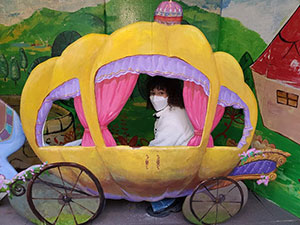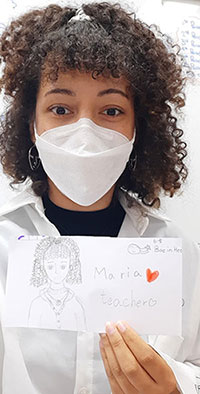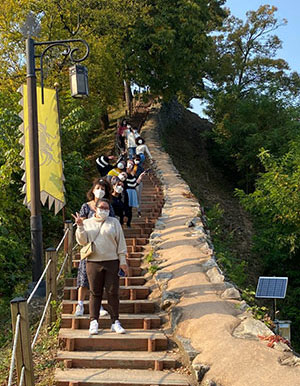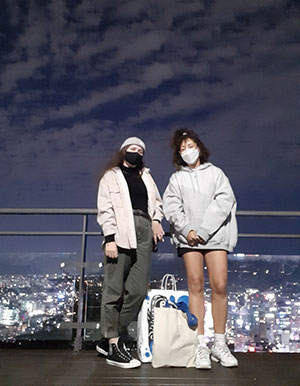
-
Teaching in a Large School During the Coronavirus
Maria Prescott
 My decision to come to Korea to teach was an easy one, despite the uncertainty of virus! And I can definitely say that teaching here during Covid has definitely been a unique experience. There are a lot of things that you have to contend with that I honestly didn’t even think about when I first arrived. I’ve always loved working with children, and I wrote my university dissertation on language learning between alphabetic and logographic languages, so choosing to come to Korea to both teach English to children and try and learn Korean myself was an obvious choice.
My decision to come to Korea to teach was an easy one, despite the uncertainty of virus! And I can definitely say that teaching here during Covid has definitely been a unique experience. There are a lot of things that you have to contend with that I honestly didn’t even think about when I first arrived. I’ve always loved working with children, and I wrote my university dissertation on language learning between alphabetic and logographic languages, so choosing to come to Korea to both teach English to children and try and learn Korean myself was an obvious choice.
The process of applying and getting accepted was a little stressful though. I got accepting in August 2020, right when Korea’s cases were starting to drop but cases around the rest of the world, including England, my home country, started to rise. This means that I had to try and get all of my documents and health tests whilst England was in lockdown. At first, no one knew how many places there were for people who got accepted, so we didn’t find out until quite late who even got a place and who didn’t. This then put everyone on a time crunch to collect all of our documents and get all of our health tests done in time to arrive for quarantine. There also was an added stress for me that the other applicants didn’t have to worry about.
 To apply for the E-2 visa in England, I had to have both a covid-19 test and a TB test both dated within 48 hours of applying for the visa. This meant that I had to try and time the dates of when the results would arrive for both of these tests to be within 48 hours of each other. The TB test results, which was meant to arrive in 5-7 days arrived the next day, which meant it would have been out of date as I hadn’t even taken my Covid test yet. Thankfully my brother is an essential worker for the government and that entitled my whole house to emergency tests as long as he gets one, so after some bribes of food, I was able to get him to get a test with me that evening and we got the results the next day. With these results I was able to take them to the embassy and apply for my visa the next day.
To apply for the E-2 visa in England, I had to have both a covid-19 test and a TB test both dated within 48 hours of applying for the visa. This meant that I had to try and time the dates of when the results would arrive for both of these tests to be within 48 hours of each other. The TB test results, which was meant to arrive in 5-7 days arrived the next day, which meant it would have been out of date as I hadn’t even taken my Covid test yet. Thankfully my brother is an essential worker for the government and that entitled my whole house to emergency tests as long as he gets one, so after some bribes of food, I was able to get him to get a test with me that evening and we got the results the next day. With these results I was able to take them to the embassy and apply for my visa the next day.
The stress did not stop there! We then had to fly out to Korea and quarantine. Many flights were cancelled as airlines had a reduced number of flights and did not want to fly long distance and as many people were not traveling at this time, many flights got cancelled. I had my flights cancelled 3 times so was worried about even being able to fly out. The process of quarantining also gave me a lot of worry. As the state of Korea was changing every day, the rules regarding quarantine also changed every day. This gave a lot of uncertainty as no one was sure what was going to happen once we actually landed in Seoul. Thankfully, despite how long you had to wait in line and how many times you had to fill out what felt like the same form, everything went smoothly and TaLK had a car ready to pick us up individually to take us to our apartments where we quarantined ourselves for two weeks.
Even with this month of stress, teaching in Korea has given me 4 months of the best experience of my life. Teaching the elementary school children here and getting to meet so many people has been so fulfilling and such an incredible experience. I work at a large school with over 25 children in every class. My schedule works with me teaching only grade 6 for 2 months and then switching to teach grade 5 for 2 months. This has meant that I have taught nearly 300 students already. Due to government regulations, schools with over 300 students had to work at 1/3 capacity, this included my school. This meant that for nearly the entirety of my first two months at school, all my lessons were online. For some teachers, this meant teaching via Zoom, but for me, it meant recording lessons and uploading them online for the students to watch in their own time. They had been studying English this way since the schools originally started shutting down, nearly a year earlier.
 This was difficult at first as I had to plan a lesson that was slow enough that they could follow along but would still take up the full 30-minute lessons without any interactions. I was also asked by the other English teacher at my school to create four lessons a week on British culture. As all of these lessons were uploaded online, we had no way of checking if the students actually followed the lessons or not. This then meant that when the students returned to having lessons in person, we had no way of knowing what the students would know and what they wouldn’t. As such, I had to gauge my students’ ability levels, I chose to spend my first week of in-person lessons with the students doing review lessons, focusing on the understanding of all the topics they had studied throughout the year, spending one lesson on speech, one lesson on writing, and one lesson on reading. Sadly, I was only teaching grade 6 for one more week after this, as the other English teacher was taking over teaching grade 6 and I took over teaching grade 5. Because of this, I had spent the next week just trying to review the older content, instead of teaching more recent content.
This was difficult at first as I had to plan a lesson that was slow enough that they could follow along but would still take up the full 30-minute lessons without any interactions. I was also asked by the other English teacher at my school to create four lessons a week on British culture. As all of these lessons were uploaded online, we had no way of checking if the students actually followed the lessons or not. This then meant that when the students returned to having lessons in person, we had no way of knowing what the students would know and what they wouldn’t. As such, I had to gauge my students’ ability levels, I chose to spend my first week of in-person lessons with the students doing review lessons, focusing on the understanding of all the topics they had studied throughout the year, spending one lesson on speech, one lesson on writing, and one lesson on reading. Sadly, I was only teaching grade 6 for one more week after this, as the other English teacher was taking over teaching grade 6 and I took over teaching grade 5. Because of this, I had spent the next week just trying to review the older content, instead of teaching more recent content.
When I first started teaching grade 5, I got my schedule and worked out how long I have left of the semester to teach them and divided the weeks into different chapters in the curriculum. When I then started teaching grade 5 in class, I again had to gauge the student’s abilities. I did this with games which involved random vocabulary from different chapters that they had been learning throughout the year. I made sure to make notes on all the students after every class that I taught with the chapter vocabularies that they seemed to struggle with the most. With this information I then tailored my following lessons for each class. Using the same game template to target the same language skills, I changed the vocabulary and key terms depending on the class reviewing the vocabulary that they struggled with the most. I then continued this, using the same lesson formats targeting the same language skills, but changing the vocabulary to best fit what that particular class of students!
 Even though classes had been in person and going well, it does not change how Covid-19 had affected teaching. We are all very aware now of how important social distancing is in stopping this disease, and it’ll be no surprise to anyone that this remains true even in the classroom. This limits a lot of what we can do during class. Due to my classes being so large, it means that my students are not allowed to move from their desks during class unless going to the bathroom. This really limits the number of things that we can do in class. I must try and keep the attention of a room full of students, mostly boys, without having them move around. To do this, I normally end my lessons with games that involve a competitive element. I have previously worked with many children of many different cultures and ages, but Korean children are the most competitive children I have ever worked with. This means that whenever I say the words ‘game time’, instantly the atmosphere inside the class gets heightened and even the students who hate English start to get involved. This is also an effective way to get the students to do tasks that they typically don’t like, such as writing.
Even though classes had been in person and going well, it does not change how Covid-19 had affected teaching. We are all very aware now of how important social distancing is in stopping this disease, and it’ll be no surprise to anyone that this remains true even in the classroom. This limits a lot of what we can do during class. Due to my classes being so large, it means that my students are not allowed to move from their desks during class unless going to the bathroom. This really limits the number of things that we can do in class. I must try and keep the attention of a room full of students, mostly boys, without having them move around. To do this, I normally end my lessons with games that involve a competitive element. I have previously worked with many children of many different cultures and ages, but Korean children are the most competitive children I have ever worked with. This means that whenever I say the words ‘game time’, instantly the atmosphere inside the class gets heightened and even the students who hate English start to get involved. This is also an effective way to get the students to do tasks that they typically don’t like, such as writing.
As the students do get at a bit intense at times with games, I try to mainly play games that don’t have winners, but still making sure to give the students a goal to reach. A good way to do this is to put a timer on while the students are playing the games, one that they can see or hear so they can know when time starts running out. Even if there is no winner, the students will still try their hardest to beat the timer. Games are also a good way to test the abilities of students without them feeling like you’re testing them. Education in Korea is taken very seriously and even if you tell the students that the test means nothing and it’s just for you to assess their skill, the students will get very stressed about getting a good score. The homeroom teachers will also take the test very seriously, and will repeatedly ask for the results as if it were and official test, so I try to give my students mini tests through games and make notes of how each student did whilst the games are happening or at the end of the lesson! With everything in the country constantly changing as cases drop and rise, with the schools closing, which mine has done 3 times since September, and then re-opening, even down to having to wear a mask all day, I can definitely say that the coronavirus has made the start of my TaLK experience here very interesting.
English Program in Korea(EPIK), Teach and Learn in Korea(TaLK)
National Institute for International Education Ministry of Education, Republic of Korea
191, Jeongjail-ro, Bundang-gu, Seongnam-si, Gyeonggi-do, Republic of Korea (zip code) 13557 Tel : +82-2-3668-1400 Fax: +82-2-764-1328
National Institute for International Education Ministry of Education, Republic of Korea
191, Jeongjail-ro, Bundang-gu, Seongnam-si, Gyeonggi-do, Republic of Korea (zip code) 13557 Tel : +82-2-3668-1400 Fax: +82-2-764-1328


